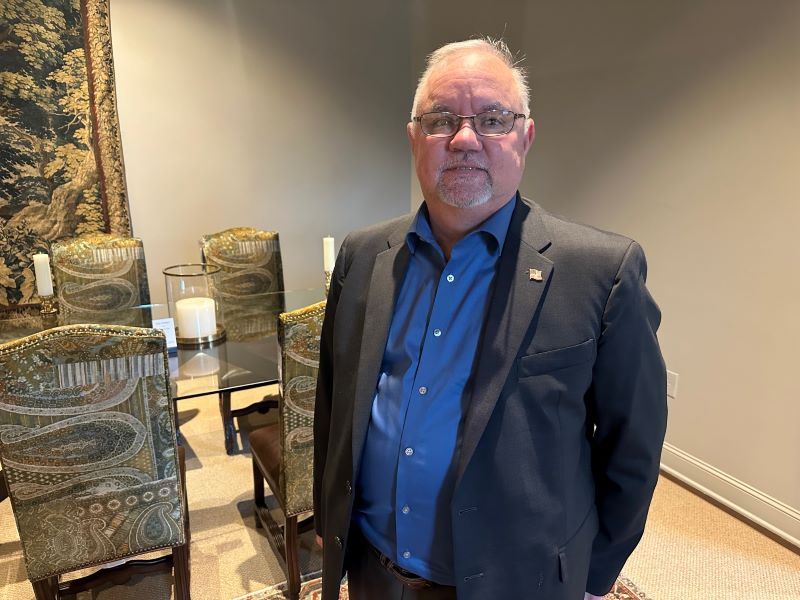Furniture manufacturer looks to tell its story to a new and growing customer base
MORGANTON, N.C. — Having grown up in the Western North Carolina region that’s home to luxury upholstery and wood furniture producer EJ Victor, Richard Oliver admits he hadn’t heard of the brand during his formative years.
Granted, it didn’t have the size, history or presence of other well-known furniture brands such as Thomasville, Broyhill, Drexel Heritage or Henredon, for example, that also once had a presence in the region, not to mention still vibrant brands such as Bernhardt, Taylor King and Universal to name a few.

That said, he knows that many others aren’t familiar with the company to this day, in or outside the industry, which is perhaps because of its smaller size and focus on the luxury segment.
Yet it’s something as chief executive officer, he wants to change for retailers and designers alike, particularly young designers and younger retail professionals that are becoming a more important segment of its customer base.
“We want to grow and we want to see sustainable double-digit growth year over year, and not just in the low double-digits,” said Oliver, who joined the company in September 2022 as chief financial officer then was promoted to chief executive officer in June 2023 with the departure of former exec David Bennett.
Of late, he said, the company has been working on infrastructure and processes that aim to help pave the way for that growth, “because the worst thing we could do is go out into the marketplace and get all kinds of business that you really can’t fulfill because your systems won’t allow you to do that.”
Earlier this year, the company implemented a new enterprise resource planning system that allows it to better manage all of its digital assets while also tracking production and inventory levels that provide salespeople and customers better real-time information for the marketplace. In addition, the system creates efficiencies in other areas, such as tracking of sales and profitability by product segment while also allowing it to automate the way it pays its bills and better track working capital, not to mention incoming orders and accounts receivable.

While this is an overly simplified way to describe the benefits of the new ERP, it ultimately has paved the way for the company to begin achieving the double-digit growth without putting the cart before the horse, so to speak.
It also allows the company to now focus on areas such as marketing and the telling of its story, in areas ranging from new product designs and collections to the quality it achieves through its custom manufacturing model that produces 100% of its upholstery and 90% of its case goods domestically.
For many years, the company built its success on the launch of major licensed collections with names such as Ralph Lauren, Randall Tysinger, Allison Paladino, Jack Fhillips and others. Today many of those lines, along with Alfredo Paredes, Brown & Moore and Bethan Gray Shamsian continue to deliver fashion-forward looks and quality for a discerning audience of designers and retailers alike.
But that story, along with the quality and design story of the EJ Victor line of case goods and upholstery overall, is made possible through the custom manufacturing capabilities of the company’s 180,000-square-foot plant in Morganton that employs on average about 170 workers.

It is that quality and that custom capability story that the company — first founded in 1990 by Edward W. Pfifer III, John Jokinen and Joseph B. Manderson — is looking to tell in a way Oliver believes needs to be told, particularly to a new generation of customers.
“This company, I don’t think, has ever been marketed to its highest potential,” Oliver said. “There are stories we have to tell, consumer stories, retail stories, product stories, stories about ourselves and who we are. We don’t tell those stories very well and we don’t tell them in a way where they actually get heard. And as the marketplace has shifted from more brick-and-mortar retail to online retail and designer business, if you are not telling those stories on the proper platforms, people don’t know about you. That’s where I think we have a huge opportunity.”
Thus, earlier this spring, the company developed an 18-month plan that Oliver said is about “how we market the business and really get the word out there about who we are to the right target group of consumers, designers, etc. We are on the cusp of starting to execute that marketing plan and I think that’s going to be very, very important to us.”
Oliver came to the company with a wealth of management expertise, and has overseen a total of seven ERP transitions. In addition to having served as president of padded sock manufacturer Thorlo for just over 25 years, he was chief financial officer of Precision Materials and has been CEO of business consulting and turnaround specialist Cardinal Business Optimization for the past two years.
He harkens back to the fact that while he grew up in North Carolina, he never had heard of the brand. But after he was introduced to the company through its auditors about two years ago, he began to appreciate its allure, having seen the line and heard stories of the sale of its products to different celebrities, including pro athletes.

“And I’m thinking, you’ve got such a great marketing story and you’re not telling anybody,” he said. “You’re only talking to each other over the water cooler about this. It’s huge and you know we don’t have to make up any stories. We just have to tell the ones we’ve got.”
Part of his job as CEO also is to help improve things from an operational perspective that continues its legacy of quality, delivery and service to its core customer base. The company’s lead times for standard upholstery are roughly six to eight weeks, which is largely what most customers expect when they shop the luxury line. Case goods are closer to 10-12 weeks, which the company is planning to align closer to its upholstery mix. Custom orders will typically take a few weeks longer in each case.
But to grow, Oliver also knows it’s important to focus on other areas of the business as well, ranging from the way it communicates among its team members to how it approaches product development.
“It think it’s just change,” Oliver said of the opportunities the company faces moving forward. “We’ve been a small company and have had a small company mindset on the way we have gone about things for the last three decades. And there are things that come out of that that are valuable to the brand. There’s a uniqueness there and there’s an exclusivity there. And those are things we don’t want to lose.

“But one of the things that also happens there is that you put structures in place that are meant to support a small business. But they won’t support you being able to scale that business. And when I talk about processes, I’m talking about things as simple as how my sales manager communicates with my customer service people, who ultimately communicate with both my product development people and my operations people, who ultimately communicate with my finance people. There are processes, streamlined processes to make sure that everybody is actually on the same page.”
And while he said the tight labor market is still a challenge, it’s not as acute as during the pandemic when employees would leave for another job that offered even a little more money. Now, people understand that if they have a history at the company, it’s not necessarily to their advantage to leave for another job where they may be the first one that gets let go during a layoff.
That said, he remains committed to his workers moving forward.
“I grew up in Western North Carolina and I’m very committed to Western North Carolina,” he said. “And I’m committed to our people. The thing that keeps me up at night is thinking about how do we make sure that we continue to take care of these people and create a community for them. They’re not employees — they’re people. They have values and they share our values.

“And so for the folks out on the floor, what I want them to experience is a value system and a community where they’re respected and where they’re treated fairly and treated honestly. There’s a lot of companies that shelter their employees from information and then all of a sudden they’re being told they don’t have a job any more. I don’t believe in sheltering people from information. When things are going well … I tell them things are going well. When things are tight, I tell them things are a little tight right now.”
As product is the heart of its business, he also wants employees to not be afraid to say when something doesn’t meet the EJ Victor standard in terms of quality or appearance.
Describing himself as consumer-focused, he also said that it’s important how the company approaches the market for its product overall.
“When I look at the marketplace, I believe our whole job is to figure out not how we fit them into our box, but how we change our box to better serve them. And that’s where I’m leading us is to change our capacities in a way that we engage the marketplace and so we’re better poised to serve them as opposed to just trying to fit them into our predefined box.”
Note: Below is a video interview that Home News Now Editor-In-Chief Tom Russell did with Richard Oliver. Click on the link to view their discussion.




